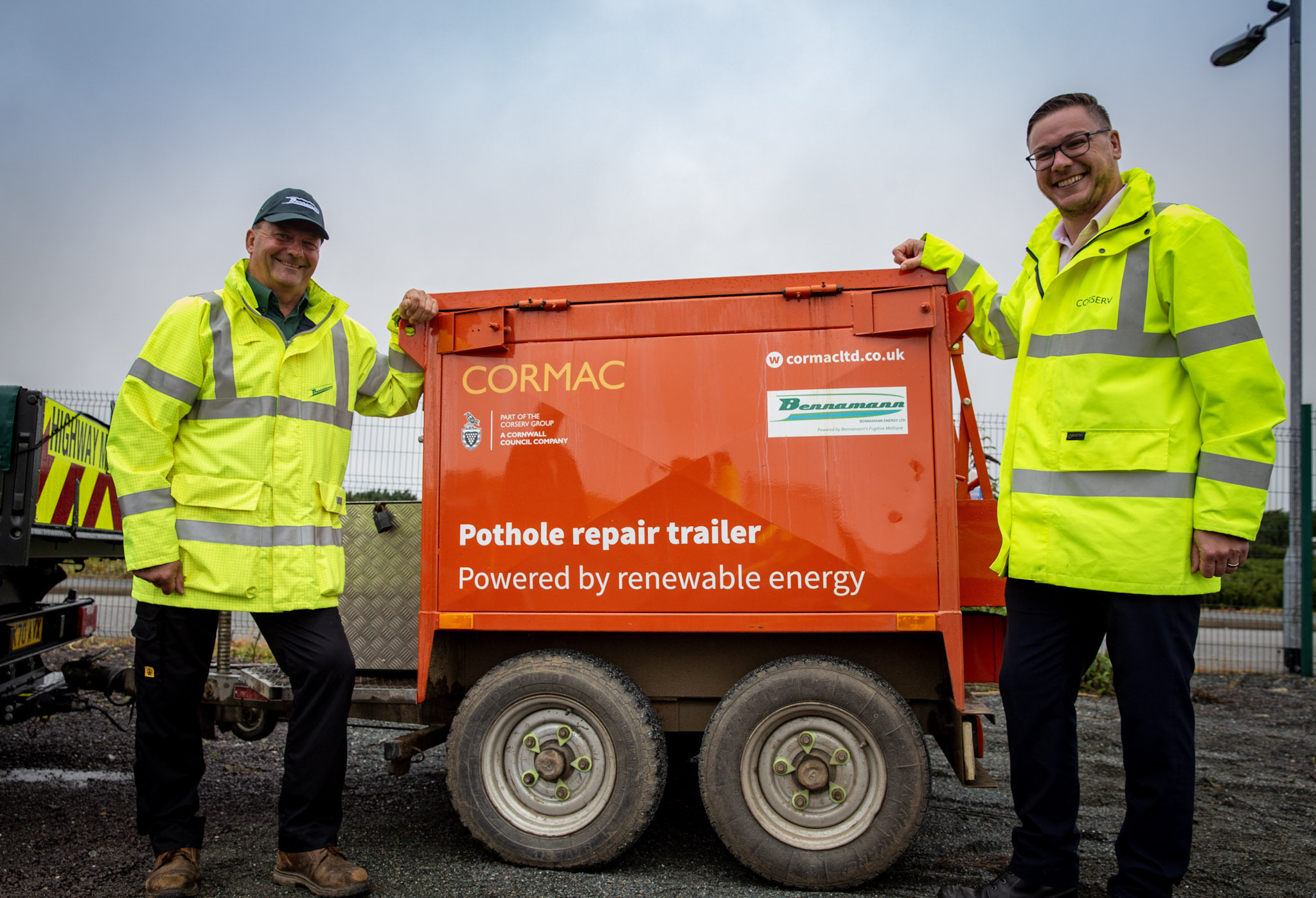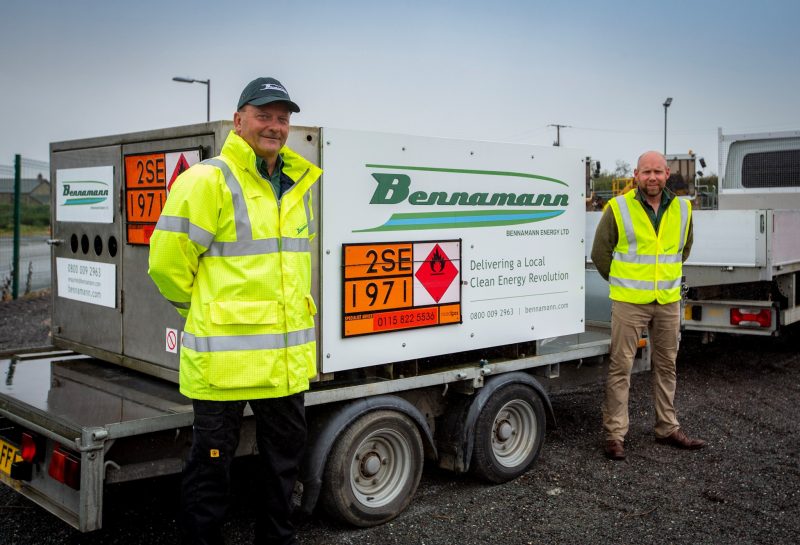
ERDF funded green energy farming project strikes deal with Cornwall Council and Cormac
Home News and events News ERDF funded green energy farming project strikes deal with Cornwall Council and Cormac
Cornwall Council is combining ambitious plans to introduce renewable fuel sources for its vehicle fleet with a ground-breaking scheme to boost the future of farming and create more green jobs for residents.
Together with Cormac, which looks after its fleet, the authority has joined forces with six of its Cornwall Council Farms estate-owned dairy farms and a Cornish technology company to trial the production of an alternative green fuel made from manure slurry in a pilot scheme believed to be the first of its type in the world.
If successful, the programme could be rolled out to hundreds of small-scale farms across Cornwall and create significant opportunities for farmers to diversify their income streams, save on operating costs, join the green economy and contribute to helping fight climate change.
The move also signals the start of the Council’s transition to running a low emission fleet and investment in world-leading sustainable agricultural technology to create more green jobs for residents and boost Cornwall’s economic recovery from the pandemic.
 Over the last two years Newquay-based clean energy company Bennamann Ltd has been testing a patent-pending engineering method to turn farm waste – such as cow manure and grass cuttings – into biomethane, a zero-carbon fuel which can be used to power heavy goods vehicles and farm machinery.
Over the last two years Newquay-based clean energy company Bennamann Ltd has been testing a patent-pending engineering method to turn farm waste – such as cow manure and grass cuttings – into biomethane, a zero-carbon fuel which can be used to power heavy goods vehicles and farm machinery.
Its pioneering work has been supported by the Cornwall and Isles of Scilly Growth Programme’s Energy Independent Farm project, which is financed by the European Regional Development Fund and led by Bennamann in partnership with the University of Exeter and Chynoweth Farm Partners.
Having already started trialling its processed biomethane in a tractor and Cormac’s fleet of tarmac hot boxes, Bennamann’s gas capture technology will now be expanded in sealed slurry lagoons on six Council-owned dairy farms located across Cornwall.
The £1.58m Council-funded pilot will see Bennamann collect and upgrade the biogas produced at the farms before delivering it to Cormac to fuel a fleet of 77 converted road maintenance trucks.
Watch a video explaining Bennamann’s method
Farms taking part in the programme can sell the captured biomethane and develop a new revenue stream.
The new programme is part of the Council’s climate change action plan to help Cornwall become carbon neutral by 2030.
It will also aid Cornwall’s Covid economic recovery in paving the way for more skilled jobs in the clean energy and environmental sectors.
The biogas project is the first step in the Council and the Corserv Group’s programme to transition towards carbon neutral fleet operations by 2030.
Along with a new electric bikes scheme for Council staff, over the coming months the Council will also be introducing a new fleet of electric pool cars, as well as piloting electric vans and Fire Service vehicles.
Edwina Hannaford, Cornwall’s cabinet member for climate change and neighbourhoods, said: “As we work on tackling the climate emergency and our Covid recovery this zero-carbon pilot will not only transform our Cormac fleet and cut emissions, it brings investment to our farms and our agricultural and technological sector in Cornwall to create long-term, quality jobs in the green economy.
“Biomethane could play an important role in helping Cornwall become carbon neutral by 2030 and this new technology developed by an innovative Cornish company will allow small scale farmers to join the growing biomethane market for the first time.”
Deputy Leader Adam Paynter whose portfolio covers Cornwall Council Farms Estate said: “This capital investment in first of-a-kind, covered, slurry lagoons can provide a commercial return for farmers and enable a rollout across all dairy farms in Cornwall, nationally and potentially globally.
“Farmers will also benefit from better slurry storage and use, savings on fertiliser and electricity bills.”
Tim Dwelly, Cornwall’s portfolio holder for economy, culture and planning, said: “Green and clean growth and decarbonisation is a key focus in our emerging local recovery planning and our draft Local Industrial Strategy which has identified agriculture and food as a distinctive opportunity.
“Our ambition is for Cornwall and the Isles of Scilly to lead on low-impact sustainable farming and fishing to provide a secure and sustainable supply of food produce.”
Chris Mann, Bennamann co-founder and chief executive, said: “Bennamann is passionate about delivering a local clean energy revolution that brings commercially viable, sustainable production and distribution of small-scale farm biomethane sourcing to the marketplace. And this ground-breaking pilot represents a significant milestone in achieving that ambition. We are proud to be a Cornish company that has the potential to radically change the global energy market and look forward to delivering a successful pilot that will put Cornwall at the forefront of pioneering renewable energy innovation, as well as help the Council achieve its zero carbon goals and post pandemic recovery plans.”
Al Hoare, group central services director for Corserv, manages the Cormac fleet, said: “Our ambition is to transition our fleet to ultra-low emission vehicles by 2030, supporting one of our key priorities of tackling climate change and increasing sustainability. While testing is still ongoing, this partnership could be a game-changer for Cornwall. Initial data suggests that each pot hole repair unit converted to run on fugitive biomethane could reduce CO2e emissions by five tonnes per year; this is the equivalent volume to an average hot air balloon and would take five native broadleaf trees to offset over their lifetime (which is approximately 100 years).”
Mark Duddridge, Chair of the Cornwall and Isles of Scilly Local Enterprise Partnership, said: “Cornwall has a growing reputation as a clean energy pioneer and this project could be transformative for rural communities and the environment by using farm waste to produce zero-carbon fuel. It complements our other renewable energy ambitions around floating offshore wind, deep geothermal and lithium extraction for electric vehicle batteries, contributing to a green economic recovery.”
European Regional Development Fund
The Energy Independent Farming project is receiving up to £ 977,376 of funding from the England European Regional Development Fund (ERDF) as part of the European Structural and Investment Funds Growth Programme 2014-2020. The Ministry for Housing Communities and Local Government (MHCLG) is the Managing Authority for ERDF. Established by the European Union ERDF funds help local areas stimulate their economic development by investing in projects which will support innovation, businesses, create jobs and local community regenerations. For more information visit England 2014 to 2020 European Structural and Investment Funds
